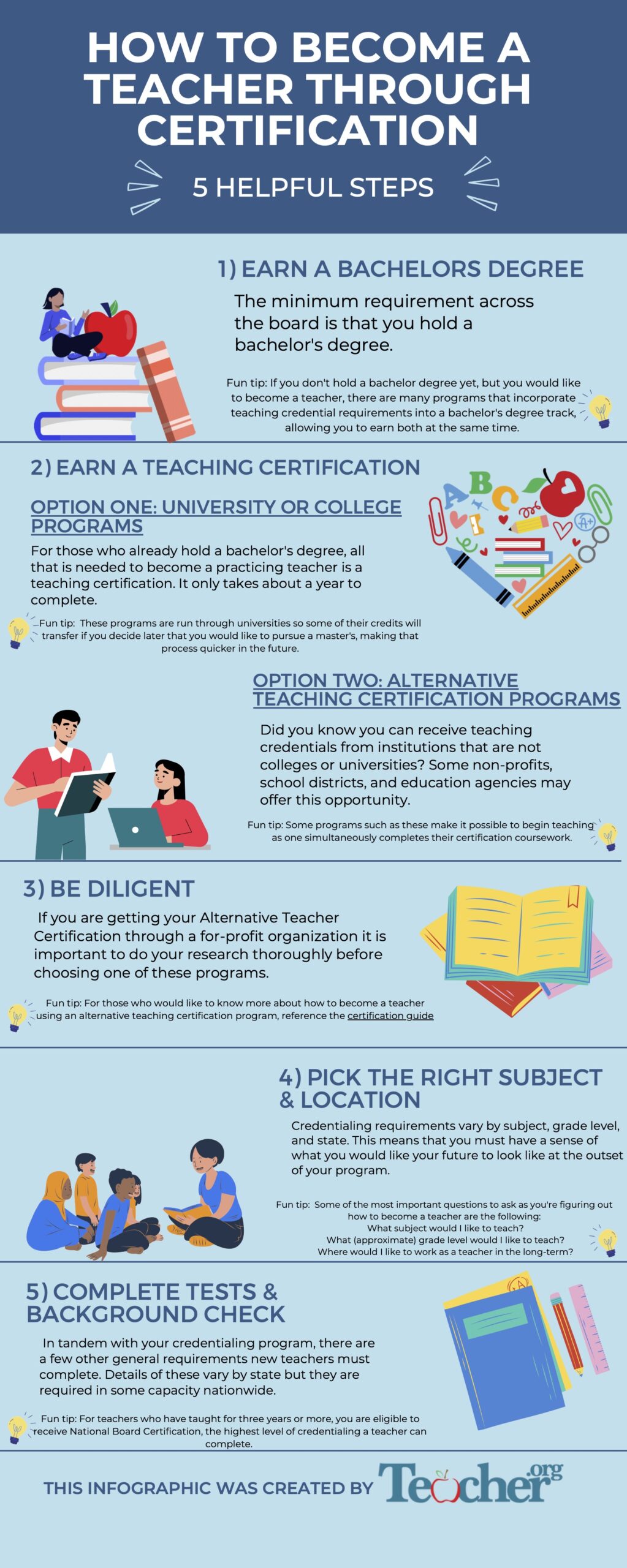How to Become a Teacher Through Certification
10/10/2022

Are you interested in becoming a teacher but aren't sure where to start? It can be daunting to begin a teaching career, as there are several paths that each have advantages and disadvantages that are worth considering carefully. Ultimately what's important is that you pick the track that is suited both to your long-term goals and to what you are capable of taking on in your current situation.
To learn more about how to become a teacher through certification, read on.
What is Teacher Certification and Why Do You Need It?
Teacher certification - also known as a teaching license or a teaching credential - is required of every teacher in the US, with requirements varying by state.
Teaching certification requirements always include mandatory coursework, classroom teaching experience, and testing.
Once you have received your teaching credential you can be entrusted with the full responsibilities of a teacher.
Teaching Career Paths
Depending on your level of education and goals for a career in education, there are different ways to pursue getting your teaching certification. The following outlines how to become a teacher no matter what your background is.
Bachelor's Degree
Though there are different ways to pursue becoming a teacher, the minimum requirement across the board is that you hold a bachelor's degree.
If you don't hold a bachelor degree but know that you would like to become a teacher, there are many programs that incorporate teaching credential requirements into a bachelor's degree track, allowing you to earn both at the same time. This does not need to be a Bachelor's in Education - it can also be a degree in a teaching subject.
Most teachers hold bachelor's degrees in the subject they are teaching, i.e. history, chemistry, or literature.
Certification Programs
For those who already hold a bachelor's degree, all that is needed to become a practicing teacher is a teaching certification.
Good news: there are teaching certification programs at colleges and universities all over the country, ranging from full-time to part-time, in-person to online.
These programs are designed for people who already hold bachelor's degrees and want to receive their certifications quickly. Some of these programs are as short as one year.
Since the focus of these programs is on meeting certification requirements, they require less schooling than a Master's in Education program. However, because these programs are run through universities, some of their credits will transfer if you decide later that you would like to pursue a master's, making that process quicker in the future.
There are many great options for teaching certification programs at universities throughout the US. To find out more about the certification you need to become a teacher in your state, visit our certification guide here.
Alternative Teaching Certification
It is also possible to receive teaching credentials from institutions that are not colleges or universities, such as non-profits, school districts, and education agencies. These are known as "alternative" teaching certification programs. Some of these programs make it possible to begin teaching as they simultaneously complete their certification coursework.
In addition to these programs, there are also for-profit organizations offering teaching credentials, but it is important to do your research thoroughly before choosing one of these programs.
For those who would like to know more about how to become a teacher using an alternative teaching certification program, reference the certification guide linked in the section above.

Picking the Right Subject and Location
Credentialing requirements vary by subject, grade level, and state. The former two factors determine the coursework you'll complete in your program, while the latter determines the course load and testing requirements. This means that you must have a sense of what you would like your future to look like at the outset of your program. Some of the most important questions to ask as you're figuring out how to become a teacher are the following:
- What subject would I like to teach?
- What (approximate) grade level would I like to teach?
- Where would I like to work as a teacher in the long-term?
It's imperative to pick a teacher certification program that will meet the guidelines of wherever you intend to work.
Completing Tests and Background Check
In tandem with your credentialing program, there are a few other general requirements new teachers must complete. Details of these vary by state but they are required in some capacity nationwide.
Praxis Test
The Praxis I test is a core competency test that measures future teachers' skills in math, reading, and writing. Not all states require this (and some allow SAT or ACT scores to count instead), but it is the most commonly taken test of basic skills for teachers.
Subject Knowledge Test (if applicable)
Depending on your chosen subject, you may be expected to take an additional test. By completing - and passing - this kind of exam, you will be able to prove to future employers that you're proficient in the discipline of your choice.
Fingerprinting and Background Check
Most new teachers are required to complete a background check and fingerprinting, as they will be working with minors. Most teaching certification programs make it easy to find the resources needed to complete these.
Applying for Licensure
The final step of receiving teaching certification is formally submitting documentation of your credentialing to the state. This can involve a bit of paperwork, but your certification program should make it easy to understand the steps and materials needed.

Achieving Board Certification
For teachers who have taught for three years or more, you are eligible to receive National Board Certification, the highest level of credentialing a teacher can complete. This is a demanding yet highly prestigious program that can have positive effects on a teacher's career, including increased salary, better professional opportunities, and easier movement between states.
How to Become a Teacher Through Certification: 5 Helpful Steps (Infographic)
Moving to a New State? Learn About How Teaching Reciprocity Works
There are many reasons why a teacher might have to move to another state. Though your teaching credential is only legally applicable in the state where you got it, teaching reciprocity makes it possible to transfer your credential over as you move, with occasional additional requirements needing to be met. This makes it easier than ever for teachers to move while continuing their careers.
- AI and The Classroom - August 2, 2023
- Side Hustles for Teachers - August 2, 2023
- How to Become a Teacher Through Certification - October 10, 2022










